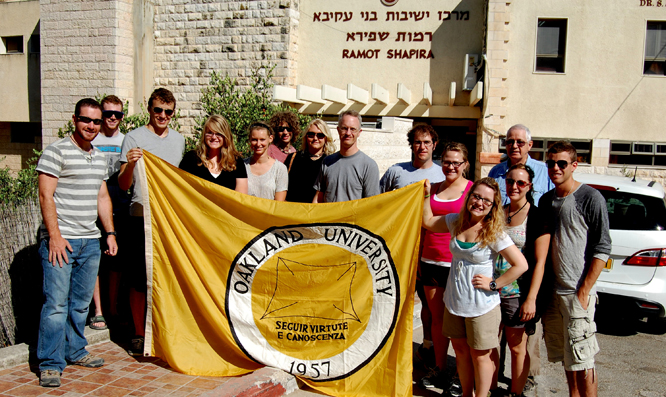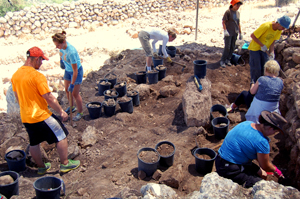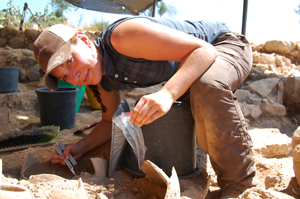 |
| Oakland students stand outside a dig hostel in Israel prior to embarking weekend trip. |
At a university that boasts many and varied opportunities for undergraduate research and unique academic experiences, perhaps one of the most extraordinary is the Summer Field School in Israel.
Each summer for the past five years, a select group of Oakland University students has flown halfway around the world to get their hands dirty digging at the biblical fortress excavation site of Khirbet Qeiyafa.
Setting the romantic vistas of popular culture aside, these students undertake serious archaeological work and study the history, culture and vast religious significance of the region. They learn proper artifact handling and pottery processing, excavation techniques, drawing of plans, and participate in lectures related to archaeology.
“The opportunity to participate in a dig, especially a high-profile excavation like Khirbet Qeiyafa, was incredible,” said Elena Durnbaugh, a junior majoring in anthropology and linguistics, who was part of the summer 2013 dig.
“Khirbet Qeiyafa isn't an obscure site that no one will ever hear about. It is a site that is revolutionizing current theories of archaeology in Israel, and I can say that I was a part of that excavation. I was there, in the dust and rocks, pulling out artifacts that hadn't been touched or seen in thousands of years. I was in a place where King David would have stood. How could I get any better than that for my first real field experience?”
Led by Michael Pytlik, director of Oakland’s Judaic Studies program, student and faculty participants spend the months of June and July working at the excavation site, and taking side trips to explore museums, parks, cultural sites and important religious sites of Christianity, Judaism and Islam.
 |
| Oakland students dig near a Persian period building, circa 450 BCE. |
“Oakland has been instrumental in the dig making such progress,” he said. “Oakland always fields the more energetic group at the site, as the dig director Yossi Garfinkel, from Hebrew University says.”
Over the years, archaeologists and students at the dig have uncovered many finds, from pottery and iron tools to architecture, houses, piazzas and city gates.
“The site has been particularly rich since the Iron Age, from about 1000 BC. Although the site was destroyed, the materials remained and were not retrieved,” Pytlik explained. “In the excavations we have uncovered the oldest Hebrew script so far found – dating to about 1050 BCE or so, and it seems to be a proto-Hebrew written in proto-Canaanite script.”
Durnbaugh is far from the only student to be thrilled to participate in the process of discovery the overseas experience offers.
“This trip has changed my view of my future career,” said sophomore anthropology major Olivia Hampton.
“I never would have dreamed that I would be travelling to Israel for an archaeological dig the summer after my first year of college. But now that I've gone, my eyes are set on constantly travelling and learning all that I can about the world’s ancient cultures.”
Durnbaugh feels the same. The opportunity to participate in the Summer Field School in Israel was a major factor in her choosing to attend Oakland.
 |
| Oakland student Jami Rathka digs into a house floor dating from 1000 BCE, the time of King David. |
“The chance to experience that historic land which so many major empires have passed through – Egypt, Assyria, Babylon, Greece, Rome – was phenomenal,” Durnbaugh said.
“The fingerprints of history can be seen everywhere throughout the country. Yet, in Israel, perhaps in a way unlike anywhere else on earth, the past is completely entwined with the present and the future, shaping everyday life to create a culture that is incredibly deep and rich.”
For Hampton, the trip changed more than her academic and career goals. It gave her new confidence and changed her life path, something that has led her to travel out of the country again next semester, this time to study at Goldsmith University in England.
“What surprised me most about this trip was how I viewed myself going in and how I viewed myself shortly after leaving,” she said.
“Entering Israel, I always saw myself as a shy person, and I feared I wouldn't talk to anyone. But into the first week of the dig I talked and befriended everyone in our group and also a majority of the other volunteers. Travelling to Israel not only helped me understand myself but it also helped me understand how other cultures live.”
Students interested in participating in the 2014 excavation can register for the Archaeology of Israel Part I and II courses, and the Summer Field School in Israel, although the trip is optional. To learn more about the Summer Field School in Israel, contact Pytlik at
pytlik@oakland.edu.



